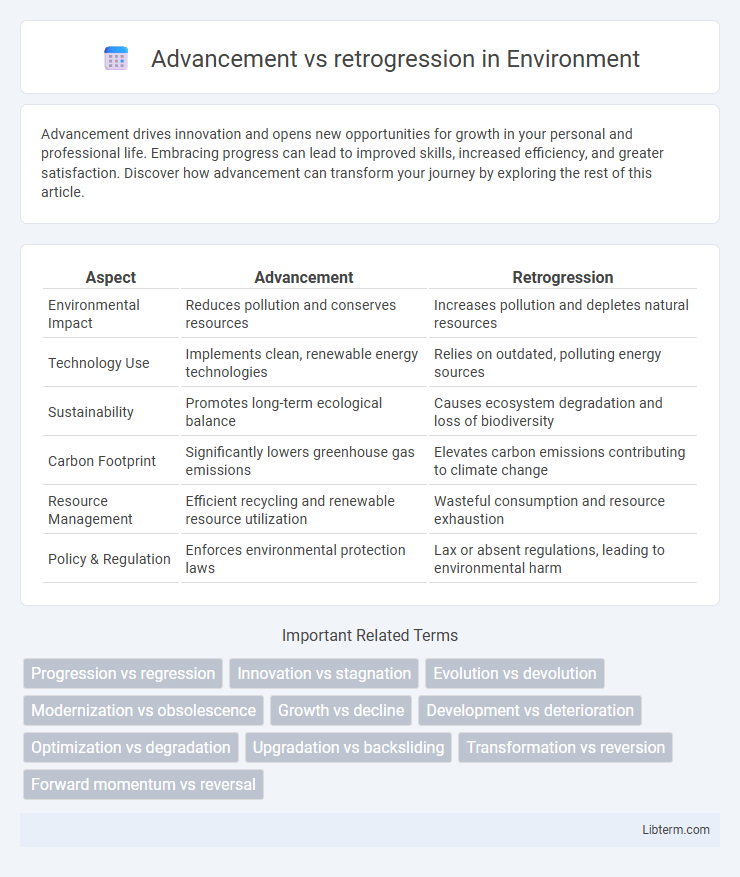Advancement drives innovation and opens new opportunities for growth in your personal and professional life. Embracing progress can lead to improved skills, increased efficiency, and greater satisfaction. Discover how advancement can transform your journey by exploring the rest of this article.
Table of Comparison
| Aspect | Advancement | Retrogression |
|---|---|---|
| Environmental Impact | Reduces pollution and conserves resources | Increases pollution and depletes natural resources |
| Technology Use | Implements clean, renewable energy technologies | Relies on outdated, polluting energy sources |
| Sustainability | Promotes long-term ecological balance | Causes ecosystem degradation and loss of biodiversity |
| Carbon Footprint | Significantly lowers greenhouse gas emissions | Elevates carbon emissions contributing to climate change |
| Resource Management | Efficient recycling and renewable resource utilization | Wasteful consumption and resource exhaustion |
| Policy & Regulation | Enforces environmental protection laws | Lax or absent regulations, leading to environmental harm |
Defining Advancement and Retrogression
Advancement refers to the progressive development or improvement in a particular field or condition, often marked by innovation, increased efficiency, and enhanced quality of life. Retrogression denotes a decline or deterioration from a previous state, characterized by setbacks, loss of capabilities, or diminished standards. Both concepts measure the direction of change, with advancement pushing toward growth and retrogression indicating regression or decay.
Historical Perspectives on Progress and Decline
Historical perspectives on progress and decline reveal cyclical patterns where societies experience phases of advancement marked by innovations in technology, governance, and culture, followed by periods of retrogression characterized by economic downturns, social unrest, or invasions. Civilizations such as the Roman Empire and Ming Dynasty demonstrate how internal strife and external pressures precipitated decline after eras of significant growth. Analyzing these patterns aids in understanding the factors that influence societal resilience and vulnerability over time.
Technological Innovations: Blessing or Curse?
Technological innovations drive unprecedented progress in healthcare, communication, and industry, fueling economic growth and improving quality of life worldwide. However, rapid advancements also raise concerns about privacy invasion, job displacement due to automation, and ethical issues surrounding artificial intelligence. Balancing the benefits and risks of technology requires thoughtful regulation and continuous societal adaptation to ensure innovation serves humanity positively.
Social Change: Forward Movement or Backward Steps?
Social change embodies either advancement or retrogression, influencing societal norms, values, and structures. Progressive reforms in education, human rights, and technology signify forward movement, enhancing equality and quality of life. Conversely, regression manifests through policies or cultural shifts that limit freedoms, exacerbate inequalities, or undermine social cohesion.
Education: Catalyst for Growth or Stagnation?
Education serves as a vital catalyst for societal advancement by fostering critical thinking, innovation, and economic development, while inadequate or outdated educational systems contribute to retrogression through skill gaps and reduced competitiveness. Investment in quality education correlates strongly with higher literacy rates, improved employment opportunities, and sustainable growth, emphasizing its role as a cornerstone of progress. Conversely, neglecting educational reforms often leads to stagnation, perpetuating cycles of poverty and limiting a nation's potential in an increasingly knowledge-driven global economy.
Economic Development: Progress vs. Inequality
Economic development drives progress by boosting GDP, creating jobs, and improving infrastructure, but this growth often exacerbates income inequality and social disparities. Technological innovation and investment attract capital, yet benefits tend to concentrate among wealthier groups, limiting broad-based prosperity. Sustainable advancement requires policies that balance economic expansion with equitable resource distribution to ensure inclusive growth.
Environmental Impact: Advancement or Degradation?
Technological advancement often drives environmental improvement by enabling renewable energy adoption, pollution reduction, and efficient resource management. However, unchecked industrial growth can lead to significant environmental degradation through habitat destruction, carbon emissions, and biodiversity loss. Balancing innovation with sustainable practices is crucial to ensuring progress benefits ecosystems rather than detracting from them.
Cultural Evolution: Preservation or Regression?
Cultural evolution is marked by the balance between advancement, which involves the preservation and innovation of traditions, and retrogression, characterized by the abandonment or distortion of cultural values. Key indicators of cultural progression include the sustained practice of indigenous languages, adaptation of art forms to contemporary contexts, and the integration of ancestral knowledge with modern technologies. Conversely, cultural regression is evidenced by the erosion of heritage sites, loss of oral histories, and the marginalization of minority cultural expressions.
Ethical Dilemmas in Progress and Retrogression
Advancement in technology and societal norms often introduces ethical dilemmas such as privacy invasion, inequality, and moral ambiguity, challenging traditional values and legal frameworks. Retrogression, while typically viewed negatively, can sometimes prompt critical reflection on the consequences of unchecked progress, highlighting the need for sustainable and ethical development. Balancing progress with ethical considerations requires continuous dialogue and adaptive policies to ensure human dignity and societal well-being are preserved.
The Future Outlook: Striking a Balance
The future outlook on advancement versus retrogression emphasizes sustainable growth through technological innovation harmonized with ethical considerations and environmental stewardship. Strategic investment in education, renewable energy, and inclusive policies fosters progress while mitigating potential setbacks. Achieving equilibrium requires continuous evaluation of societal impacts to ensure advancements benefit humanity without causing detrimental regressions.
Advancement Infographic

 libterm.com
libterm.com